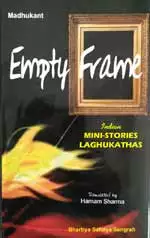|
कहानी संग्रह >> एम्पटी फ्रेम एम्पटी फ्रेममधुकांत
|
347 पाठक हैं |
|||||||
मधुकांत के कहानी संग्रह का अंग्रेजी अनुवाद
Foreword
(Madhukant's Mini-stories)
At the very outset I must congratulate the Mini-story writer Sh Madhukant for having taken the bold step of getting his stories translated in English with such a deep confidence in his own writing as well as in the ability of the translator, Sh. Harnam Sharma, who has accomplished the task quite satisfactorily. My congrats to him, too.
In the literary milieu, various forms and styles have been evolving from time to time to meet the challenges of the times and taste. The form of Mini-story (Laghu Katha in Hindi) did not take shape in a day or two. It took time to develop. In fact it became the need of the present time readers, keeping in view their fast pace of day-to-day life impacted by technological advancement as well as greed for material comforts. Other fictional forms like Novel or even short story (Kahani in Hindi ) gradually lost their grip on the common readers who wanted a quick end or solution to a predicament or social problem preferably with a surprise, a revelation or a sting in the end. If the end could highlight the paradox of the situation or depict the contradictions in diverse aspects of human nature or human condition, it contributed to the success of the mini-story, told in the most economical way.
A good mini-story daringly lifts up a lively, exciting moment of a man's life and throws it in the face of reality. Then all the illusions of man's or society's great ideals and all the false masks worn by them are torn apart bringing to the fore the stark, harsh nature of reality. Thus a mini-story becomes a small attempt in search of harmony and truth. We, the sensitive writers feel that human nature is compounded contradictory attributes. Good and evil are evenly mixed up in man, who is mostly ambivalent in his conduct. Wherever we turn, we find blatant contrasts of all kinds in human affairs. A mini-story writer has to hit a fish's eye in nailing this truth.
I am quite happy to note that the writer, who is known for his stories about the educational world i.e teachers management, students and the government authorities etc, has not confined himself to this limited field of education in these stories, which, instead, relate to various spheres of human concerns i.e. homes, markets, relationships, pros. houses, police stations, courts, fields and farms etc.
Broadly speaking we can divide this spectrum of themes in the following categories
1. Greed of Business Community : (As in The Real Earning, A Wolf in Sheep's clothing, Man on Sale, The Bankrupt etc.)
2. Dignity of Labour : as in the Stockist, The Lesson Awakening etc.
3. Women Liberation and Allied Themes of Rape, Honour Killings, Separation etc : as in The Decision, The Caged Maina, Daughters, The Rituals, Realisation, Untouched Tangible, The Rule of Brothel, The Trial, The liberated, For herself etc. Here women revolt and defy.
4. Honesty and Introspection : as in Bad Adour, The Rich and the Beggar etc.
5. The Police Connection as in : The Abuse Begins, The Ghost of Fear, Alert, Witness, Sinful Earning etc.
6. Law and Order situation and Justice : as in House of correction, Snake and Ladder, Medicated Pain etc.
7. Poverty : as in Enemy, The Season, Bread First etc.
8. Artist's Dignity : as in The Invisible Poet, Artist by Heart, Pain etc.
9. Human Relations : as in Relation, The Blind Race etc.
10. Dignity of the physically challenged : Some of these mini-stories have been taken from the writer's recent book 'Hosla' (courage) as Valour/ Fortitude, Capable, Everyone has a duty, False Currency Notes etc.
11. Miscellancous : this category also includes political corruption and dishonest practices as in Compromise etc.
|
|||||


 i
i 










